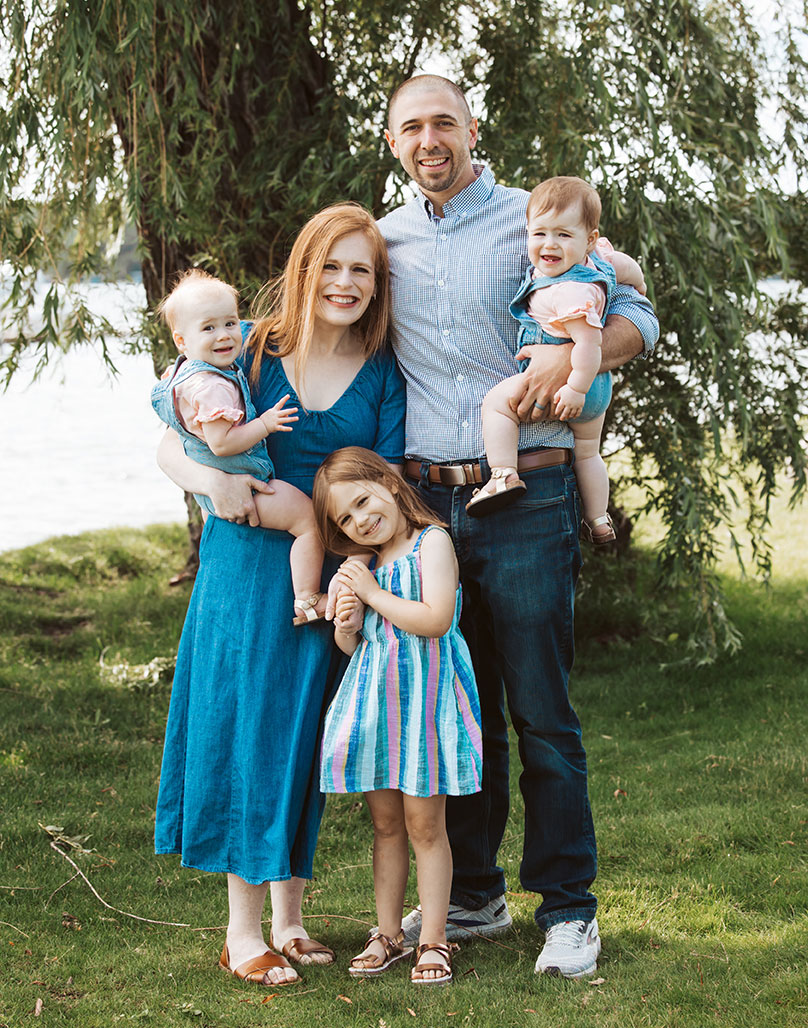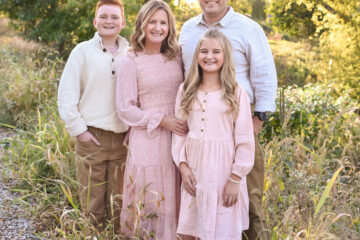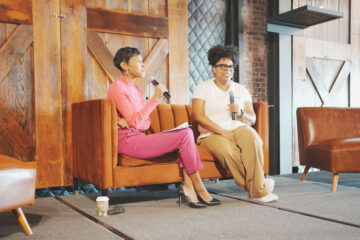Essay: How becoming a mother taught me the importance of self-advocacy

By: Jaclyn Overton
My oldest daughter just turned 5. Looking back at photos from the day she was born, I’m reminded of the pure, unmatched joy I felt. Becoming a mother was something I dreamed of more than anything, and it’s a title I feel so deeply honored to have.
As I look back, that joy is what I hold onto most. But there’s another side of the story I carry with me, too.
That day, I learned just how close joy and fear can live, and how experiencing both has shaped the way I want to show up as a mother, a friend, and for myself.
When I was pregnant with my first daughter, the pregnancy was smooth and low-risk. Still, I worried. Was she growing as she should? Would she be born prematurely? Would she have complications and need time in the NICU? I agonized about her well-being for 39 weeks. And when I finally heard her cry for the first time, I exhaled a breath that I felt like I’d been holding for nine months.
They gave her to me, and I saw how perfect she was.
But a few moments later, the doctor asked my husband to take our daughter. They couldn’t get my bleeding under control.
As they worked, they talked through contingency plans: medications first, a medical device if needed, emergency surgery and a hysterectomy as a last result.
In all of my worrying and the countless scenarios I’d imagined, this was one I never considered: complications of my own.
Thankfully, my care team managed to stabilize the bleeding through medications. In total, they estimated I lost around four times the amount of blood as a normal delivery.
Postpartum hemorrhage is a complication in 1% to 5% of births and the second leading cause of maternal death in the U.S. I was lucky. No surgery or transfusions were required. Just extra iron and time to recover. Other women who experience postpartum hemorrhage face far worse outcomes.
Still, it took me a long time to process the magnitude of that day. And if I’m honest, I think I’m still processing it in some ways. It was the first time I felt like my body had truly failed me.
When my husband and I considered expanding our family a few years later, I knew I had a slightly elevated chance of postpartum hemorrhage recurrence. But now I had a beautiful little girl who depended on me. Should we even try for another child? Was the risk too great?
Wanting to be as informed as possible, I sought out a highly recommended OB-GYN. She was incredible, taking the time to listen to my concerns and explain every precaution they could take. Her reassurance and perspectives on the potential risks helped me feel as confident as I could in the choice to expand our family.
I became pregnant again in 2022. This time, though, it was with twins — a factor that moved me into a high-risk pregnancy and further increased my risk for postpartum hemorrhage.
I left that seven-week appointment overwhelmed and terrified.
In the weeks that followed, I realized the best way to combat my fear was to advocate fiercely for myself because in doing so, I was advocating for my family too.
For 38 weeks, I told every doctor I saw about my past complications and asked how any new recommendations might affect my risk. Speaking up often felt uncomfortable, but I knew it was the best way to ensure the safest outcome for me and my children.
In the spring of 2023, we welcomed two beautiful, healthy baby girls into the world. While I still lost 1 1/2 times more blood than an average twin delivery, my care team was prepared. Prophylactic medications and a medical device quickly controlled the bleeding.
I share this story because Jan. 23 marks National Maternal Health Day — a reminder of the critical importance of maternal health in pregnancy. I was fortunate to have access to the right expertise and resources, but as maternal mortality rates rise across the nation, we must ensure the same holds true for every woman. This is especially important here in Iowa, where we rank last in OB-GYN access per capita.
I knew motherhood would teach me so much, and yet, some lessons caught me completely off guard. This journey has shown me how vital it is to advocate for myself and be a voice for others. If there’s anything from my own maternal health journey I could pass along, it would be this:
Advocate fiercely for yourself. As women, we’re quick to advocate for our children, spouses and parents but often hesitate when it comes to our own health. I’ve learned that advocating for my health is an act of love for my family. Speak up, ask questions, get second opinions and demand the care you deserve.
Advocate fiercely for the women in your life. Share your story and encourage others to do the same. Your experience could be the nudge someone needs to take their health concerns seriously. Let’s prioritize women’s health in our conversations and ensure every concern — whether maternal or otherwise — is met with attention and compassion.
Advocate fiercely for our community and initiatives that push us toward better outcomes. New and innovative programs like MercyOne’s statewide Maternal Transport Team are stepping in to provide support for rural, high-risk pregnancies. Efforts like these deserve our full support. They will save lives.
When I think back to the births of my daughters, I used to struggle with the mix of emotions I felt. That it was wrong to let fear and trauma cloud such beautiful milestones. But as I’ve reflected on those moments, I’ve come to see the beauty in their complexity.
It’s the combination of joy and fear, love and grief, that has shaped me into a stronger mother and friend. I’m more grateful than ever for the life I get to live and the daughters I get to love. And most of all, I’m proud to show my girls how to advocate fiercely for themselves and for the people they care about.
Jaclyn Overton is a wife, mother, marketer and lifelong Iowan. She and her husband stay busy keeping up with three beautiful, spirited daughters.

